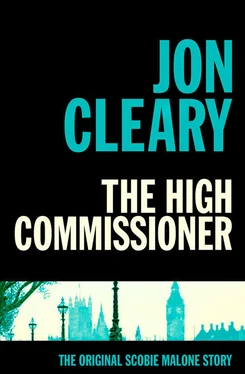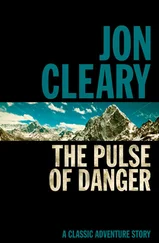Malone, still aware of the closeness of Lisa, his nostrils clogged with a mixture of Dettol and her perfume, sat quiet, waiting for Quentin to answer his wife’s question. Quentin, as if he were avoiding Malone’s stare, looked down into his Scotch and said, “Mr. Malone is a security man. That’s all I can tell you.”
“Secret Service?” Sheila sounded a little incredulous, almost amused.
Lisa, her medical aid done, stepped back, looked at Malone and smiled. “Somehow one never thinks of Australians as spies.”
Malone stood up. He went to open his mouth, to tell the truth, get it over and done with; then saw the look (of warning? Or of pleading?) on Quentin’s face. He took a sip from his glass and said almost lamely, “I am not a spy. All I have to do is look after your husband, Mrs. Quentin.”
“You mean you were expecting something like tonight to happen?” Sheila’s poise began to crack again; something like hysteria bubbled just below the surface of her. She had looked so intact, so self-possessed, that it was now like looking at another person, a relative with a family resemblance. “God, I can’t believe it! Why should anyone want to kill my husband?”
In the end everything is personal to a woman, Malone thought. Viewed from her angle it meant nothing that her husband was his country’s ambassador, that he was the influential man at a conference which, one way or another, was bound to have influence on the future of world peace. She could only see him as her husband: a wife had no diplomacy when she saw her marriage endangered. Malone looked at Quentin, a doomed man: Flannery was waiting for him in Sydney, someone outside in the London dark with a gun.
“I’ll do my best to see it doesn’t happen, Mrs. Quentin,” he said, and felt like a man promising to stop a landslide with a shovel.
Then Joseph knocked on the door. “There is a phone call from Sydney, sir, for Mr. Malone.”
“We’ll take it in the study.” Quentin put down his glass. He looked like a man who had reached the end of his endurance: he was being shot at from near and far, they had got his range.
“Tell them you need more protection,” Sheila said, then gestured helplessly. “Or ask them to recall you. Anything.”
Quentin nodded and patted her arm reassuringly. Then he smiled slightly at Malone as he stood aside to let the latter go ahead out of the room. They went into the study, closing the door after them, and Quentin said, “Do you have to tell the Commissioner about tonight?”
Malone put his hand over the phone. “Scotland Yard will tell him as soon as they learn who I am. You shouldn’t have told your wife I was a security man.”
“What else could I say in front of Lisa?”
Malone stared at him for a moment, having no answer; then he took his hand away from the phone and answered the operator. How much simpler the world must have been before Alexander Graham Bell, he thought.
Leeds came on the line, his voice shredded by static. “Scobie? I’ve seen our friend. He wasn’t happy, but he’s agreed. On patriotic grounds.” Despite the static the sarcasm came through loud and clear. “When will the conference finish?”
“It almost finished tonight,” said Malone, and told Leeds what had happened. The line was silent for a while but for the interference; Malone began to imagine that he was listening to the grinding of teeth. “Are you there, sir?”
Something like a sigh came from ten thousand miles away. “My first reaction is to say bring him home at once. But what comes first? Justice or patriotism?”
This has probably never happened before and will never happen again, Malone thought: the Commissioner asking a detective-sergeant for advice. Malone looked across at Quentin standing in front of the fireplace. Behind the older man the ormolu clock ticked quietly, like a slow teletype: time was running out, was the message. He looked disengaged, already resigned to the fates, a man already in the dock. Christ Almighty, Malone thought, I’ve just been elected to the jury. Don’t get involved, Leeds had advised; and now had tossed him the rope that could bind him to Quentin.
“I think we should stay on here, sir,” he said, and committed himself to Quentin. He cursed the Commissioner, cursed Flannery, thought of the simplicity of a murder in Bexley North: that had been his last case, the arresting of a garage mechanic who had killed a man with a tyre lever for sleeping with the mechanic’s wife. An open and shut case with no involvement at all: the mechanic, struck dumb by grief or hate, had never opened his mouth, never even looked at Malone for help or sympathy.
“Good luck,” said Leeds, safe on the other side of the world. “And be careful. I don’t want someone taking potshots at you .”
Malone hung up and looked at Quentin. “He left it up to me.”
“I gathered that. I’m getting more and more in your debt.”
“I’m a tough creditor,” said Malone, trying not to sound like a liar. “Don’t ask for too much more.”
II
When they went back into the living-room Lisa had gone, but two men were there with Sheila Quentin.
“Superintendent Denzil and Sergeant Coburn.” Sheila had regained her composure; she had learned her lessons well as a diplomat’s wife. “From Scotland Yard.”
“Special Branch,” said Denzil, and gave a purple tone to the word Special : he was not a hoi-polloi policeman. He was a squarish man running a little to weight; every so often he seemed to become conscious of his belly and would tuck it in, like a man trying to hide the error of an indulged life. Bright blue eyes in his red face gave him a false impression of cheeriness; the wide, thin-lipped mouth told the truth. He’d arrest his own mother, Malone thought, if it meant promotion. Despite the warm evening he was dressed in a tweed suit, a regimental tie, with stripes that went ill with his red face, hung on his broad chest. He had a gruff fruity voice, full of a false bonhomie that could trick an unwary prisoner. “Someone took a shot at you, sir. We’ll have to put a stop to that.”
“I’d appreciate it,” said Quentin, and Denzil looked at him, as if not certain whether the High Commissioner was being ironic or not.
“The constable tells me he found nothing over in the gardens. But Sergeant Coburn is going over just to double-check.”
I bet the uniformed boys love working with you, Malone thought.
Coburn nodded and went out of the room. He was a young man, tall and thin, his face all bone and dark intense stare. He looked as if he might never laugh, but that might be because he was always with Denzil. He had one eyebrow that sat much higher than the other, and Malone suspected he would never get far in the Force: he would always look quizzical of his superiors.
When the door closed behind Coburn, Denzil said, “Mrs. Quentin tells me you are from Australian Security, Mr. Malone. Have you been in touch with anyone else at Special Branch?”
“Mr. Malone only arrived tonight from Australia,” Quentin said quickly.
Denzil nodded as if that were no excuse at all. “Did you have any suspicions that something like this might happen to His Excellency? Was that why you were sent over, Mr. Malone?” He smiled mechanically, his big white teeth appearing between the thin lips like a blank illuminated sign. “I’m looking for some sort of lead, you understand.”
Malone looked at Quentin. “I think I’d better have a few words alone with the superintendent, sir.”
Quentin stared at him; for a moment Malone expected to see the pleading look again, and suddenly felt resentful. Don’t ask any more favours; you’ve had your lot.
Конец ознакомительного фрагмента.
Читать дальше












